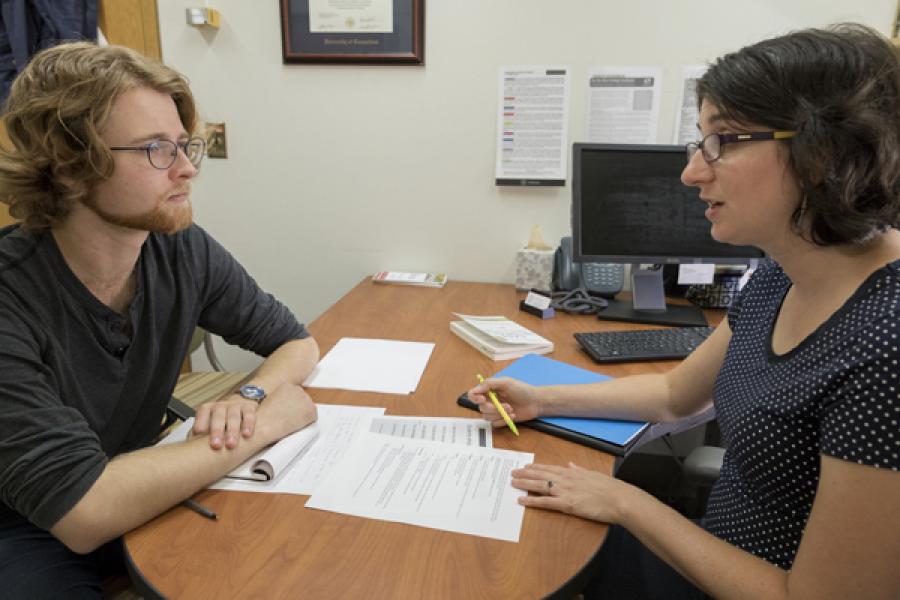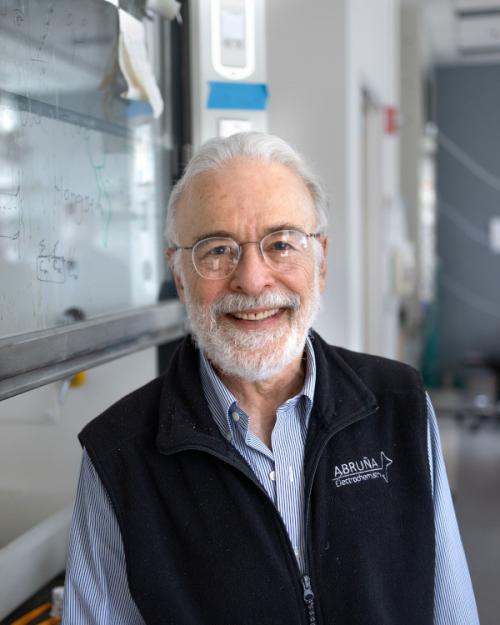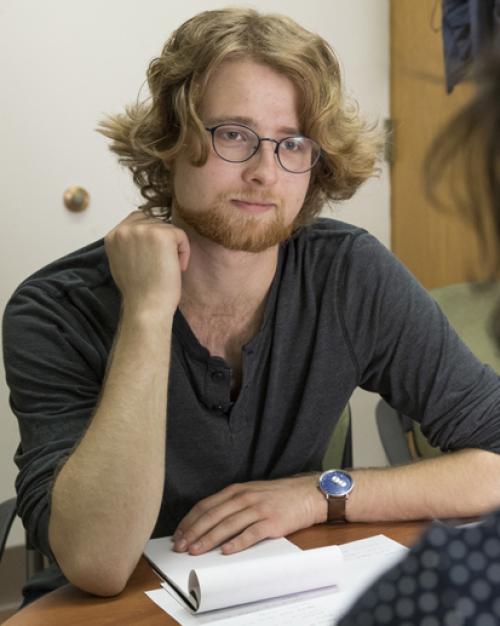This story is one in a series, checking in with some of our seniors to explore how they’re doing as they plan for life after Cornell.
James Bessoir’s ’18 resume was mostly filled with summers spent volunteering for a non-profit until this past spring, when he landed a sweet internship with NASA. Paola Ocampo ’18 is applying to grad school, but she worries about a few specific classes she hasn’t had. Ryan Ramano ’18 spent last summer at an investment bank and already has a position lined up for after graduation.
The life of a Cornell senior is filled with conflicting priorities – there’s the pressure of looking for a job or applying to grad school, the stress of pulling together a senior thesis or honors project, the reading and problem sets for upper-level classes and the pull of an active social life, knowing that this is the last year you’ll get to spend every waking minute with some of the best friends you’ll ever have.
For some students like Bessoir and Sarah Zumba ‘18, days are filled with visits to the career fair, online searches for job postings and application emails and letters.
“It can be a bit overwhelming,” said Bessoir, a double major in history and government. “Making time to do the intangibles, like browse for jobs, is really hard when you have a full reading list. For many seniors, we’re also trying to figure out what city we want to live in, if we want to live with our parents … if we’re going to have to live with our parents.”
Zumba, who is looking for a job in journalism, said the search process is complicated in that field. “Career fairs have mostly companies like IBM or Google, not many media or creative companies,” she said. “Journalism is similar to business – it’s dependent on networking.”
Cornell offers a host of career development resources for students — from resume reviews and mock interviews to one-on-one sessions with career counselors, vast online resources and alumni connections, both in person and virtual — and staff encourage students to take advantage of the resources long before their senior year.
“We think about career development as a holistic process: first, helping students understand their interests, strengths and values; then exploring their options through actions such as networking or internships; and then taking action by applying for jobs or graduate school,” said Jen Maclaughlin, director of the A&S Career Development Center. “By the time senior year rolls around, students have had the space to explore different career trajectories, and most have a clear direction that just needs to be executed.”
James Bessoir '18, left, gets some advice from Jennifer Maclaughlin, director of the Arts & Sciences Career Development Center
Maclaughlin has been a godsend for Bessoir, he said, guiding him to job options and helping him refine his resume and learn how to sell his skills to prospective employers. She also connected him to alum Ellen Gertsen ‘02, who works at NASA and helped him find a position during his Cornell in Washington program in spring 2017.
"Like a lot of Arts & Sciences students, I know how to write, I’m good at communicating and have taken varied classes,” he said. “But those skills don’t make a resume, so you have to prove it to somebody some other way.”
Zumba has also used career services as she researches news organizations and searches for Cornell alumni who are involved in media. “I’m a city girl so I want to work in a city,” she said, adding that she’d like to cover issues of race and culture. For now, she’s focused on job-related research and practicing her interview schools — the cold calls and cover letter writing will begin in earnest in the winter, she said.
Preparing for graduate school
While students like Bessoir circulate resumes to potential employers, Ocampo and others are studying for tests like the GREs, MCATs or LSATs and combing through graduate school website to determine where they should spend the next couple of years. A linguistics and psychology major, Ocampo wants to work with children who have speech and communication disorders so she plans to apply to grad programs in speech pathology.
“I was advised to get a broad education in psychology and I’m glad that I did, “she said. “I have a broad understanding of child development, of linguistics and the theoretical side of it and, combined with my other classes, it’s made me a well-rounded student.”
Paola Ocampo '18, left, works with grad student Isobel Heck in the lab of Katherine Kinzler, associate professor of psychology, in Uris Hall
As a first-generation bilingual student from Queens, Ocampo would love to go to Columbia University in New York City, where the program focuses on teaching students to work in diverse populations, but she’s applying to four or five other programs, as well. She’ll take the GREs in October, collect references and apply by Dec. 1, go on interviews in January and February and wait for word from the schools in April.
She’s already reached out to Columbia, expressing her interest and sitting in on some classes. She’s also had a grad student in her lab review her resume and consulted with various advisors in the Office for Academic Diversity Initiatives, as well as her faculty advisor. She plans to also schedule some mock interviews with the A&S Career Development office.
“I’m someone who believes in building a support system so wherever I’ve gone, I’ve tried to find a mentor,” Ocampo said.
Fresh from her first medical school interview, Mary Melati ’18 is feeling optimistic. With a resume full of research experiences at Weill Cornell and on campus, clinical experience and grades and MCAT scores that she’s proud of, Melati is excited for the next step.
Rather than take a gap year, which many students decide to do between their undergrad degree and medical school, Melati feels ready to forge ahead.
Melati said Ana Adinolfi in the career development office has offered advice ever since her freshman year, at first on navigating the premed curriculum and now about the many steps of applying to medical school. Now, Melati offers the same advice as a student advisor in the Office of Undergraduate Biology.
For medical school students, the timeline is a bit protracted. They can be offered interviews starting the summer before their senior year through the winter and admission offers can come in from fall through spring. Students have to choose a school by April 30.
Two of Melati’s most formative experiences have been her time as a Weill Cornell Travelers Summer Research Fellow and her volunteer work at the Ithaca Free Clinic. In both cases, she’s had the chance to work with and for underserved communities, helping her confirm her interest in primary care.
At the free clinic, she helped patients with paperwork, registration and prescription questions, but was also called in to examinations rooms by doctors when they saw a patient with an interesting case. She also won a grant to help the clinic with outreach, buying socks, hats and gloves imprinted with clinic information and passing them out to people at the Ithaca Rescue Mission during weekly visits last spring.
“The people who come in to the free clinic have diseases that are so preventable, but when they come in, it’s often in the later stages, when it’s hard to manage. I wanted to help people come in earlier,” she said. “It was so amazing to see the response.”
Enjoying his senior year
While many of his peers ponder their next steps, Ryan Ramano ’18 has already accepted a job in investment banking with Nomura in New York City. He’ll start in July of next year with a month of training in London.
An economics major from the island nation of Mauritius, Ramano is happy to be moving to the city and ready for the challenge of a starting position with the company, where he spent this past summer as an intern.
“The hours were long and the work was difficult, but the internship gave me 10 weeks to decide if this was what I wanted to do,” he said. He was happy to get a call with an offer on the Monday after his last day. “As the summer went on, they started to treat me like a first-year analyst and I felt ownership of my projects,” he said. “But you never know. Even though I learned from my mistakes, I wasn’t sure of the impression I left on people.”
Clearly the impression was impressive.
Ramano felt confident during his internship thanks to classes and his experience in groups, including the Cornell Hedge Fund and Cayuga’s Watchers, where he holds the role of vice president for finance on the executive board.
Now that his plans are secure, Ramano said he’s trying to enjoy his last year. “I want to make sure I do all that I can at Cornell,” he said. “I’m spending a lot of time outdoors, going to concerts. I want to make the most of my time on campus.”






